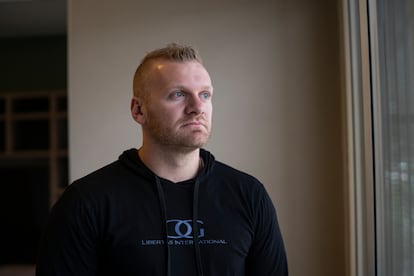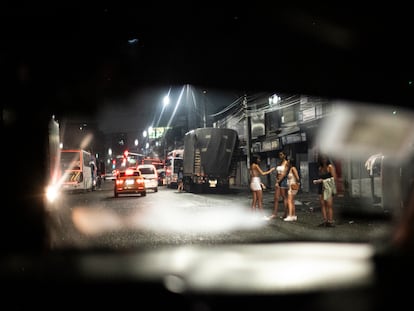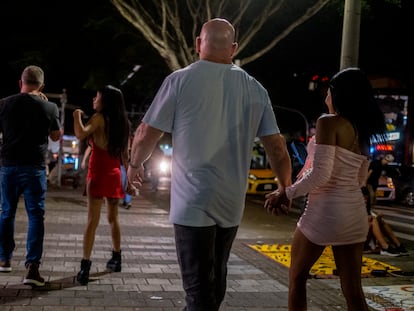Tyler Schwab, activist against sexual exploitation disguised as tourism: ‘The gringos who abuse Colombian girls make me angry’
Founder of the NGO Libertas International, the US citizen has identified Americans who come to Medellín with the purpose of sexually abusing minors

A few months ago, Tyler Schwab, a 33-year-old Wyoming native, was heading to New York to attend the trial of Angad Amit Beharry. Accused of pedophilia, he had paid a Venezuelan woman for pornographic videos that had been recorded in the Colombian province of Antioquia, in which this mother sexually abused her baby. Libertas International, the NGO that Schwab founded in 2013, was supporting the little survivor and her new caregiver.
This is just one of several cases of sexual exploitation that Schwab tracks in Colombia. He gave up his medical studies to dedicate his life to the fight against the sexual exploitation and trafficking of girls in Latin America. In recent years, he has focused his NGO’s efforts on survivors in Medellín, a Colombian city where several of his “countrymen” — as he calls them — have sexually exploited minors behind the false curtain of tourism. His organization has supported more than 80 girls over the last two years. In addition to providing support to victims, Libertas International applies pressure so that perpetrators — especially those from the United States — are made to face justice.
In a hotel in western Bogotá, Schwab speaks with EL PAÍS about the scourge of sexual exploitation of minors in Colombia and the fight that lies ahead.
Question. How did you learn of the sexual exploitation of minors in Latin America?
Answer. When I was 19, I lived in the Dominican Republic as a missionary. There, I saw many girls on the streets with foreigners. At first, I didn’t even understand what was happening… but those images stayed in my head. I decided to go back. Upon returning, I understood the reality. I went to a brothel, where I found a pimp and a girl who was about 14. I paid to talk to her. She told me that her family was going hungry and that she had accepted a job offer to be a waitress. Afterwards, she was forced to sleep with men, because the pimp threatened to take advantage of her younger sister if she didn’t: 80% of the earnings went to that man.
I was very shocked and wanted to talk to her the next day, but they had already moved her. I never found out what happened to her. I spent two weeks talking to victims in the Dominican Republic. Some were immigrants, there were trans boys… others were from Venezuela, some had their documents taken away. This made me understand what was happening and I decided to change my life. I wanted to try to support them.
Q. After those meetings, what did you do?
A. I left my medical studies and underwent training on human trafficking. From there, I started working on prevention, then intervention and aftercare. Libertas International was formally born in 2013. I started working in the Dominican Republic. Then, I began to get calls about cases in Guatemala and Peru.
An agent from HSI (Homeland Security Investigations, the principal investigative arm of the U.S. Department of Homeland Security, responsible for transnational crime) contacted me. She told me: “We have a case and I want to introduce you to a girl.” They told me that they had found her in an Airbnb with a guy, who had been sent to prison. The man, Víctor Galarza, raped girls, trafficked them and shared their images online. He was convicted in June of 2022. [The girl] was the first survivor I supported in Medellín. When I got there, everything changed. That case made me very angry. I decided that I wanted to dedicate 100% of my time to helping girls in Colombia who have been victims of Americans.
Q. What characterizes sexual exploitation in the Dominican Republic, Guatemala and Colombia?
A. Each country has particularities. There’s “sexual tourism” everywhere… although I don’t like that term, because they’re not tourists. They’re criminals — pedophiles — who travel. In the Dominican Republic, I found many families who were selling their children. That also happens here in Colombia. In Guatemala, there were gangs like MS-13 and Barrio 18, which were selling girls and women.
In Colombia, some girls have been victimized by the FARC and the ELN, but in Medellín, we mostly find lots of gringos who take advantage of girls, so that they can rape them. They leave them with sexual diseases, with horrible trauma. The videos [of the rapes] are posted online. Many return to the United States as if nothing has happened. That fills me with anger. The gringos who use Colombian girls — who are victimized by my countrymen — make me very angry.
Q. Your organization has 32 open investigations into Americans who have engaged in acts of sexual exploitation in Medellín. Why do you think they’re coming to the city?
A. It’s a very good question. I’ve thought a lot about that, including last year, when the Colombian [National] Police gave me an award. In my speech, I could only ask for forgiveness [for the crimes committed by] my countrymen. Colombia has suffered from the addictions that gringos have: drugs and sex, including sex with minors. I wonder what’s on their mind… I really don’t know. They’re pedophiles. I don’t think we can get to the point of knowing how a person can travel to another country and think that, just because there are vulnerable people around, he has the right to do whatever he wants with them.
Q. What’s your opinion regarding how the authorities and Colombian society have handled this situation?
A. We’ve had difficulties with some prosecutors. For example, recently, a prosecutor was asking for more victims in a case: we needed five, because four weren’t enough to open an investigation. That seemed very wrong to me. It was like hearing that, in Colombia, the first four rapes are free — they’re on the house — while the fifth isn’t. There’s a big problem there. One victim is always more than enough.
Q. Sometimes there’s talk of child prostitution: it’s believed that minors aren’t being exploited, because they’re “agreeing” to have relationships. Do you think that, in Colombia, sometimes the victims aren’t even recognized? And that they’re even treated as victimizers?
A. That happens a lot. Even the girls [who are being exploited] often don’t recognize it. But you have to go further — you have to open your heart. If a child is having sex, there’s something behind it. That’s why we have to change the way we talk about the subject.
Q. The Office of the Attorney General of Colombia has records of nearly 8,000 minors who have been victims of crimes related to sexual exploitation in the last five years...
A. I think that’s a very low figure. We receive a new case every 15 days. In the last two years, we’ve served more than 80 girls in Medellín alone. We’ve also handled cases in Cartagena, Cali, Bogotá, La Guajira and Cúcuta. Additionally, there are cases of Colombians outside the country. For example, two years ago, in the Dominican Republic, there was a giant operation where 83 Colombian women were rescued. And, last year, there was another large action in Greece. We know of many girls who are exploited by the Tren de Aragua (a major transnational Venezuelan criminal organization). Given this reality, the numbers are low.
Q. In most of the cases that Libertas International knows of, American citizens are involved. Why is that?
A. First of all, there’s widespread sex addiction. Pornography has never been more accessible. In the U.S., it’s consumed a lot. In addition, there are groups and networks to talk about how to get girls. It’s just a matter of time before predators travel to other countries to commit crimes. Many live a double life: there are police officers, teachers, and professionals [who are] pedophiles and abusers.
I think racism is also a factor. Many think that a Colombian girl is worth less than an American one. That happened in the case of a teacher from Texas, who had a girl in his house and — according to her — he had never touched her. [But in Colombia], he used drugs and raped girls — he made them feel as if they were going to die.
Q. You often attend the trials against these individuals. What do you observe in their behavior?
A. Seeing the fear on their faces impacts me a lot. They’re cowards who look for little girls to exploit. But when those girls have the support of women, journalists, police, or prosecutors, [the abusers] are no longer as strong as they think when they’re taking advantage of those girls.
Q. One of your goals is to push for justice for survivors. How does your organization do this?
A. We’ve found very good police officers in Colombia and the United States who, from time to time, require funds to do their job effectively. For example, if we’re in Medellín and the police officers we work with are in Bogotá, we pay for their trips, so that they can interview the girls and make an arrest. When an interpreter is needed, we pay for this service, so that the arrest is properly done.
Mervin, our director of justice, knocks on the prosecutors’ door here [in Colombia]. In the U.S., we work with the Department of Justice to ensure that the girls are heard in court. If they can’t go, they at least write a letter for the judges to read. We also fight for restitution: we want the exploiters to pay for the girls’ therapy and other expenses they may have. For example, we have a case in which a man tattooed his name on the back of a survivor. We want him to pay to remove that tattoo. That’s very important for victims.
Q. How do you ensure that survivors break the chains of exploitation?
A. We focus on building and supporting their life projects — what they want and what it takes to achieve them. Ninety percent of the girls we support don’t return to that life. Those who do break our hearts… but there’s always the offer that they can come back whenever they want.
Q. What changes should Colombia implement to combat the exploitation of minors?
A. We must hit the bad guys with very strong sentences, take away all their money and show their faces everywhere. They have to know that the police and the Office of the Attorney General are going to put them in prison — even if there’s only one victim — and that they’re going to be labeled as pedophiles for life. That they’re going to have nothing in their bank accounts and that they’ll live in a Colombian prison for 30 years.
On the preventive side of things, we need to invest in education. In the United States, we also have to ask ourselves what we’re doing to prevent this from continuing to happen.
Q. What motivates you to continue this fight?
A. Sometimes it’s hard. When we remove one [sexual abuser], two more appear. I’m motivated by survivors. Their messages of love and affection show that our work means something.
Q. What’s the next step for Libertas International?
A. We’re going to continue expanding. I want to support those who’ve been victims of Americans in Cartagena, Cali, Bogotá, anywhere. I’d also like to reach countries like Haiti and Mexico, but always without neglecting what we’ve achieved in Medellín.
Sign up for our weekly newsletter to get more English-language news coverage from EL PAÍS USA Edition









































